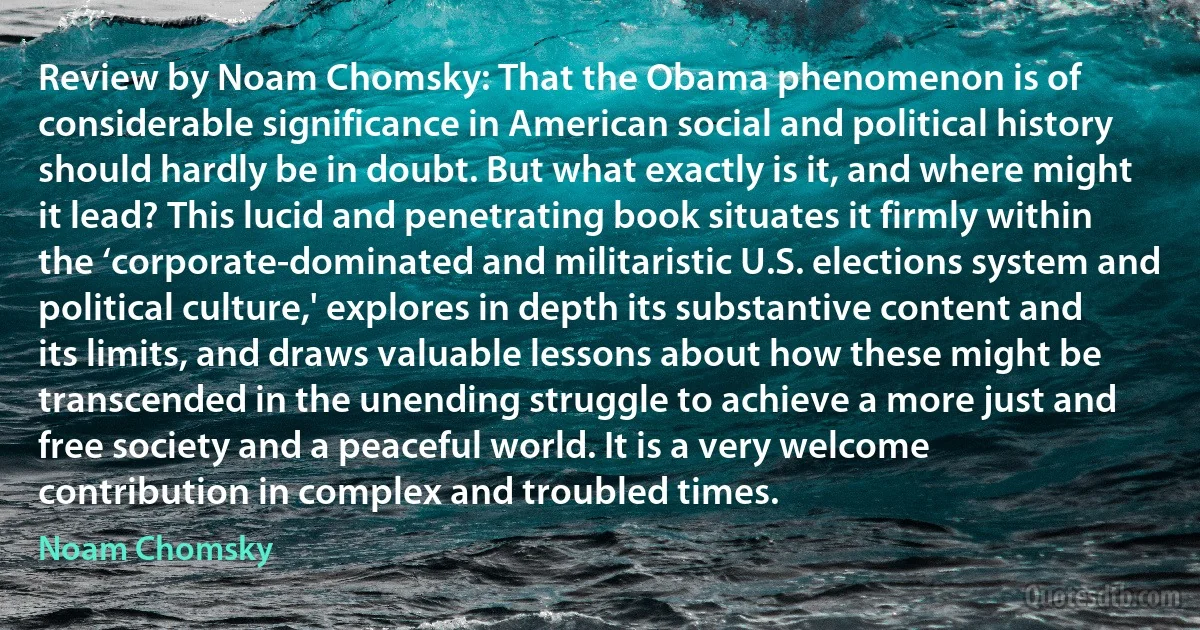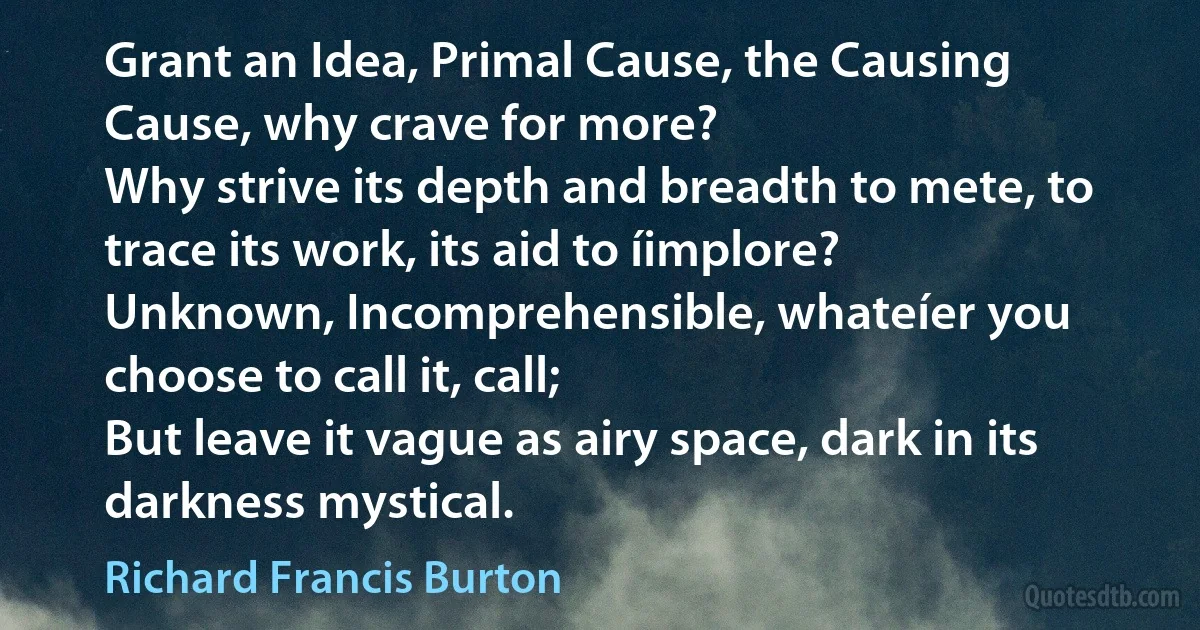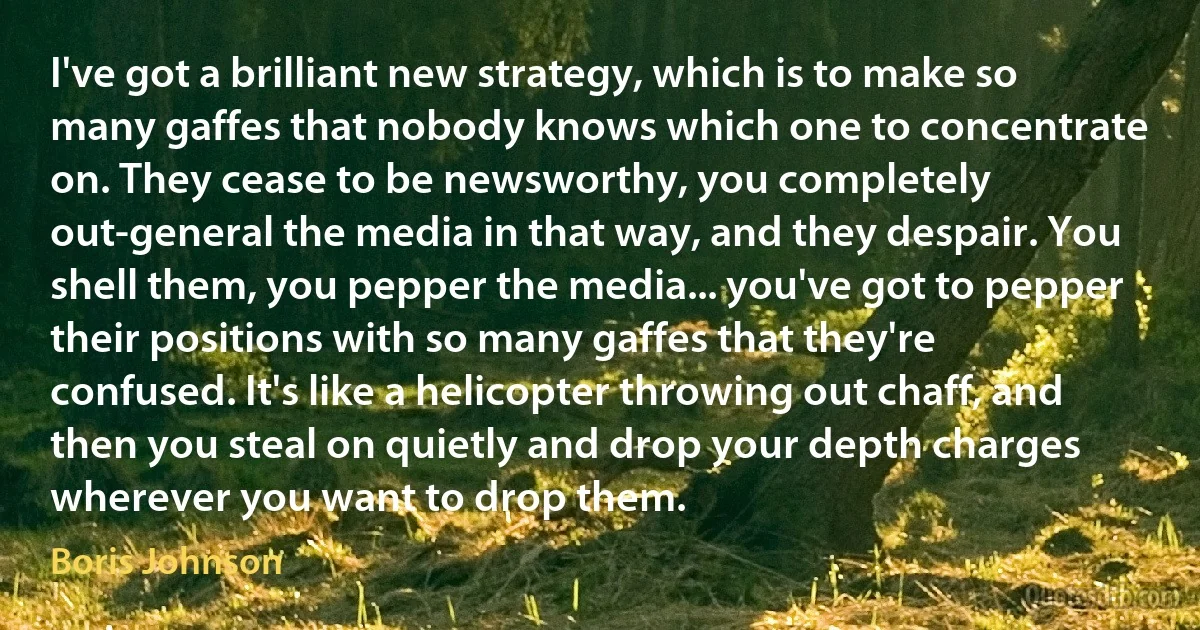Depth Quotes - page 23
I am impressed by what I read, by the depth of his ideas, of his message. He speaks about peace from a very original and unique perspective. We are used to hearing speeches about peace. We usually tend to leave peace in the hands of governments or political organizations. Prem Rawat speaks about peace from a different perspective-more precise, more human-and he stresses the significance of each human being in the pursuit of world peace. I find great merit in his message.

Prem Rawat
Just as gold tarnished in depth (cf. Jms. 5:3) cannot be properly purified and restored to its proper brightness unless it is cast in the fire and thoroughly hammered with mallets, so when the soul has been tarnished with the rust of sin and become thoroughly useless it cannot be cleansed and recover its original beauty unless it meets many trials and enter into the furnace of tribulations.

Symeon the New Theologian
Life on earth is too brief, so brief that we cannot even imagine. But much has been provided for us in this brief period of time that we are in this life. It has been given to us so that we can always turn to God from the depth of our heart. He is the One Who can transform and resurrect our souls.

Tadej of Vitovnica
The dark ages still reign over all humanity, and the depth and persistence of this domination are only now becoming clear.
This Dark Ages prison has no steel bars, chains, or locks. Instead, it is locked by misorientation and built of misinformation. Caught up in a plethora of conditioned reflexes and driven by the human ego, both warden and prisoner attempt meagerly to compete with God. All are intractably skeptical of what they do not understand.
We are powerfully imprisoned in these Dark Ages simply by the terms in which we have been conditioned to think.

Buckminster Fuller
Hell no,” Jim said when they were alone in the suite. "Absolutely no. No fucking way, no. There have got to be a billion different ways to say no, and I'd still have to cycle through them a couple times to really express the depth of no on this one. Clarissa Mao? On the Roci? How is that anything but a massive load of let's-not-do-that?

Daniel Abraham
Man is not a rational animal; he is a rationalizing animal.
"For explanations of a universe that confuses him he seizes onto numerology, astrology, hysterical religions, and other fancy ways to go crazy. Having accepted such glorified nonsense, facts make no impression on him, even if at the cost of his own life. Joe, one of the hardest things to believe is the abysmal depth of human stupidity.

Robert A. Heinlein
A classic example of a naive dogma is the Biblical story of creation, followed by that of the first human couple: if we are skeptical, we balk at the childishness of the literal meaning; but if we are intuitive − as every man ought to be − we will be sensitive to the irrefutable truths of the images; we feel that we bear these images within ourselves, that they have a universal and timeless validity. The same observation applies to myths and even to fairy tales: in describing principles − or situations − concerning the universe, they describe at the same time psychological and spiritual realities of the soul; and in this sense it can be said that the symbolisms of religion or of popular tradition are a part of our common experience, both on the surface and in depth.

Frithjof Schuon
Most books belong to the house and streets only, ... But thIS ... addresses what is deepest and most abidlllg in man .... Its truth speaks freshly to our experience. [the sentences of Manu] are a pIece with depth and serenity and I am sure they will have a place and significance as long as there is a sky to test them by.

Henry David Thoreau
I first had to discover certain things for myself, and essentially it was the behavior I observed in human subjects in my laboratory study of markets that motivated me eventually to study Hayek seriously. Reading with the eyes of a new mind, I was able to appreciate an enormous depth of understanding in the work of Hayek that would have escaped me if I had not had this personal experience in the laboratory.

Friedrich Hayek
We are to remember what an umpire Nature is; what a greatness, composure of depth and tolerance there is in her. You take wheat to cast into the Earth's bosom; your wheat may be mixed with chaff, chopped straw, barn-sweepings, dust and all imaginable rubbish; no matter: you cast it into the kind just Earth; she grows the wheat, - the whole rubbish she silently absorbs, shrouds it in, says nothing of the rubbish. The yellow wheat is growing there; the good Earth is silent about all the rest, - has silently turned all the rest to some benefit too, and makes no complaint about it! So everywhere in Nature! She is true and not a lie; and yet so great, and just, and motherly in her truth. She requires of a thing only that it be genuine of heart; she will protect it if so; will not, if not so. There is a soul of truth in all the things she ever gave harbor to. Alas, is not this the history of all highest Truth that comes or ever came into the world?

Thomas Carlyle
The most important mine of Jesus-Maria at this time was one called Santa Juliana, which had been the means of alternately making and sinking several splendid fortunes. This mine had then reached a depth of between eight and nine hundred feet, and the operations were still tending downwards. The materials were drawn up by mule power applied to a windlass: but as the rope attached to it only extended half way down, another windlass had been erected at the distance of about four hundred feet from the mouth of the cavern, which was also worked by mules, and drew the ores, etc., from the bottom. On one occasion, as I was standing near the aperture of this great pit, watching the ascent of the windlass-rope, expecting every moment the appearance of the large leathern bucket which they employ for drawing up the minerals as well as the rubbish and water from the bottom, what should greet my vision but a mule...

Josiah Gregg
A real mezzo soprano has depth and substance. Madonna´s voice is such a basic material that it can go towards many different colours, depending on the meaning of the song. That is also a great skill. It´s like a good photo model whose face would not attract particular attention without makeup but who can look stunning in different pictures with a skillful makeover. Likewise, Madonna likes to change her voice according to the songs.

Madonna (entertainer)
The total subject of mathematics is clearly too broad for any one of us. I do not think that any mathematician since Gauss has covered it fully and uniformly, even Hilbert did not, and all of us are of considerably lesser width (quite apart from the question of depth) than Hilbert. It would therefore, be quite unrealistic not to admit, that any address I could possibly give would not be biased towards some areas in mathematics in which I have had some experience, to the detriment of others which may be equally or more important. To be specific, I could not avoid a bias towards those parts of analysis, logics, and certain border areas of the applications of mathematics to other sciences in which I have worked. If your Committee feels that an address which is affected by such imperfections still fits into the program of the Congress, and if the very generous confidence in my ability to deliver continues, I shall be glad to undertake it.

John von Neumann
Attention involves seeing and hearing. We hear not only with our ears but also we are sensitive to the tones, the voice, to the implication of words, to hear without interference, to capture instantly the depth of a sound. Sound plays an extraordinary part in our lives: the sound of thunder, a flute playing in the distance, the unheard sound of the universe; the sound of silence, the sound of one's own heart beating; the sound of a bird and the noise of a man walking on the pavement; the waterfall. The universe is filled with sound. This sound has its own silence; all living things are involved in this sound of silence. To be attentive is to hear this silence and move with it.

Jiddu Krishnamurti
Art thou a type of beauty, or of power,
Of sweet enjoyment, or disastrous sin?
For each thy name denoteth, Passion flower!
O no! thy pure corolla's depth within
We trace a holier symbol; yea, a sign
'Twixt God and man; a record of that hour
When the expiatory act divine
Cancelled that curse which was our mortal dower.
It is the Cross!

Sir Aubrey de Vere, 2nd Baronet
I first auditioned Kate Winslet when she was 17. I thought she was 25. Such was her self-possession, presence and concentration...later, I cast her as Ophelia in a film of Shakespeare's Hamlet. I did not ask her to audition...She listened with superhuman acuity, and expressed character with effortless depth... (now) those same qualities are radiant, having now evolved into a truly awesome acting technique. Only now, hers is the art that entirely hides the artist...It's magnificent to watch.

Kate Winslet
When you're an artist, you pick up on certain things that are in the air. You just feel it. It's not like you're sitting down, thinking, "What can I do to really mess things up?" You're getting ideas, and then the ideas feed into a story, and the story takes shape. And if you're honest about it and you're thinking about characters and what they do, you now see that your ideas are about trouble. You're feeling more depth, and you're describing something that is going on in some way.

David Lynch
If you complain of neglect of Education in sons, what shall I say with regard to daughters, who every day experience the want of it? With regard to the Education of my own children, I find myself soon out of my depth, destitute and deficient in every part of Education.
I most sincerely wish that some more liberal plan might be laid and executed for the Benefit of the rising Generation, and that our new Constitution may be distinguished for encouraging Learning and Virtue. If we mean to have Heroes, Statesmen and Philosophers, we should have learned women. The world perhaps would laugh at me and accuse me of vanity, But you I know have a mind too enlarged and liberal to disregard the Sentiment. If much depends as is allowed upon the early education of youth and the first principles which are instill'd take the deepest root, great benefit must arise from literary accomplishments in women.

Abigail Adams



